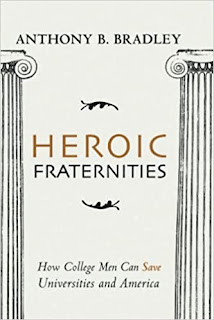"Heroic Fraternities" by Anthony B. Bradley. A Review
We’re in an era of widespread fatherlessness, where dad’s spawn kids and then walk away, or up and leave them and their mothers, or are physically present while emotionally distant. It’s part of what lies behind the “daddy-issues” that haunt many kids, teens and adults. Therefore, to build up virtuous and quality manhood in boys and young men, is a noble and honorable task. This desire fuels Anthony B. Bradley, professor of religious studies, director of the Center for the Study of Human Flourishing at The King’s College in New York, and research fellow at The Acton Institute. And this noble desire is crystal clear in his spanking new 222-page softback, “Heroic Fraternities: How College Men Can Save Universities and America”. Between the covers of this easy-to-read book, Bradley strives to restore the honorable goals of college fraternities, reclaiming their original concept of fostering heroic masculinity. A campus brotherhood that helps young men to “use their presence, power, strengths, and creativity to benefit those around them.” Where they “recognize that making the lives of other people better is one of the most fulfilling and rewarding things a man can do.” Which is something that “gives a man a sense of purpose and direction in life. Everything about him makes other people better” (4).
The book opens up into two parts. The first section chronicles what campus fraternities were originally about and how they have benefited young men in character development, and ways they are instrumental in keeping men from falling into the purpose void. The author also shows the valuable means by which fraternities foster long-term male friendships. But Bradley doesn’t shy away from the growing problems in campus life in general, and fraternal life more specifically. He records many situations and incidents where fraternities have failed in Animal House fashion. As he observes, “The most disordered fraternities are the ones most lacking mature male guidance” (52).
But gallantly, the author pushes hard against such ugly trends in this work and presents several concepts to aid fraternities to move upward and onward so they can help make men more virtuous or heroic. As he notes, “the future of college fraternities must be a call to heroic masculinity—men using their power, presence, strengths, and creativity for the benefit of their brothers and those around them. It’s a call to live lives of excellence, honor, and virtue. It’s an invitation to put themselves in the position to always add value to their campuses. Heroic masculinity is an invitation to set up men for holistic success…” (69-70). As I read through the book I kept thinking, “This is not just for fraternities on campus. Our churches need to read this and think through ways to promote heroic masculinity!”
The second section of the work is a series of seven interviews with young men from seven different fraternities on separate campuses. The conversations circle around the ways the interviewees found their experiences shaping and beneficial as they worked toward their degrees. It also gathers, in their own words, where there has been moral failure on the part of some “Greeks” and how it was dealt with. This is a down-to-earth section, and even concludes with a touching special dedication “of this book, and the entire heroic fraternity project, to the heroism of the brothers of Alpha Tau Omega at Grand Valley State University, and to the memory of Quinten “Quinn” Campbell (2002–2021). May his memory be eternal” (177).
There were several unfortunate editorial slips throughout the volume that were mildly annoying. Nevertheless “Heroic Fraternities” was a valuable read. It should have an immediate and special place for all campus fraternities, administrators, donors, alumni, and “Greeks”. But beyond Bradley’s aim, I would say, as a Christian minister, this volume needs to be worked through by congregational leaders for the sake of the young men in their parishes. I highly recommend the book.
My thanks to Wipf and Stock for sending me an electronic version of the book. They happily sent me a .pdf version and made no demands. Thus, this review is freely made and freely given.




Comments